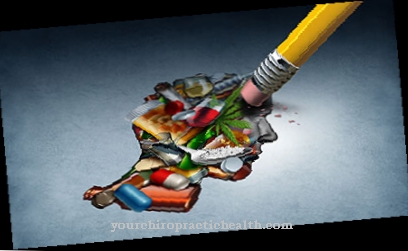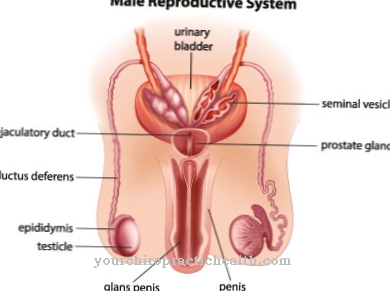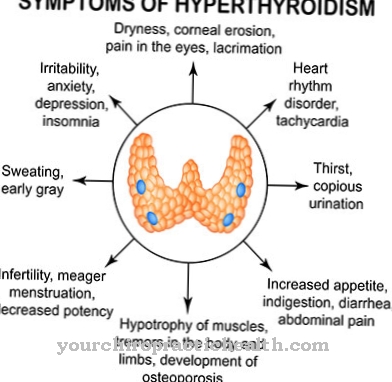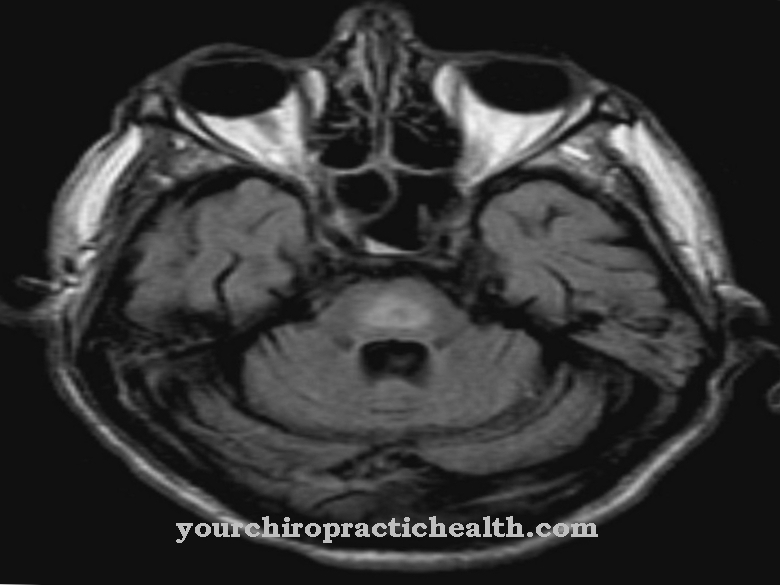A Addiction disease is a disease that is characterized by an uncontrollable desire for a certain substance or activity. This can be alcohol, medication, drugs, sex or gambling. Addictions usually have severe psychological and / or physical consequences for those affected.
What are addictions?

© freshidea - stock.adobe.com
Experts understand the term addiction to be a dependence on a substance or an activity that the person concerned cannot control.
Physicians accordingly differentiated between substance-related and substance-independent dependence. The latter is also referred to as activity addiction. Substance dependencies relate to a substance such as alcohol, drugs or medication. Activity addictions can include gambling, work, sex, or even exercise. The person concerned experiences a feeling of elation or relaxation by acting out his addiction.
The experience represents a temporary escape from reality and must be repeated after the associated feeling has subsided. In return, those affected sometimes accept criminal acts. Some addictions are accepted by society, while others are generally rejected.
causes
The causes of an addiction disease have not yet been clearly scientifically clarified. Basically, however, it can be stated that social as well as biological and psychological factors are involved in the development of addiction.
Often people are affected who have to deal with a severe psychological trauma and cannot deal with the experiences they have made. Even socially disadvantaged people, whose life is difficult, often tend to develop addictions.
On the other hand, wealthy people can also be affected if, for example, they feel bored with life and are therefore looking for an escape from reality. Addiction disorders occur in all social classes and affect people with a wide variety of personality structures.
Symptoms, ailments & signs
The first sign of addiction is often that the person is consuming the substance more often or for longer than originally planned - or that they spend more time at the gaming machine or computer than intended. At this point, however, many addicts persuade themselves that they still have drug use or behavior under control.
When the sufferer finally tries to reduce or stop using it, it does not succeed or it involves considerable effort. As a rule, the addict is aware that continued use has negative effects, even if he can deny this to other people.
In order to pursue the addiction, those affected often withdraw. They isolate themselves privately and often cut themselves off from their families. They may no longer perform their household, childcare or work duties as they used to. Addicts often give up their hobbies. Many addictions lead to financial problems as the money is spent on drugs or gambling.
A clear sign of substance dependence is the development of tolerance. The same dose of a drug has a weaker effect than before. Therefore, addicts often increase the dose. If the addiction cannot be lived out, withdrawal symptoms show up. The symptoms the withdrawal leads to depends on the addictive substance. With behavioral addictions, withdrawal symptoms can consist of restlessness, fear, aggressiveness, and mood swings.
Diagnosis & course
If there is an addiction, a diagnosis is often difficult, because those affected usually only admit their problem when they are already suffering from severe physical or mental impairments.
The mere consumption of the addictive substance or its quantity does not provide any information about the presence of an addictive disease. The attending physician must therefore combine psychological and medical tests and carry out blood and hair examinations in addition to a detailed discussion. Abuse of substances in particular can be determined based on the physical effects.
Addictive diseases generally require treatment, otherwise they will intensify and affect the person affected and their environment. Substance-related addictions in particular also damage the body and can potentially be fatal.
Complications
Addictions can cause a variety of physical, emotional and psychosocial complications. Drug or alcohol addiction often leads to irreparable liver damage, seizures and sensory disorders caused by nerve damage are also possible. In many cases memory deteriorates, and severe alcoholics not infrequently suffer from dementia known as Korsakoff syndrome.
Some drugs trigger hallucinations that are extremely frightening for those affected or drive them to overestimate themselves: The result can be fatal accidents or suicide. Perceptual disorders, delusions and motor disorders often occur during withdrawal, and many addicts suffer from depression during the drug-free period. When drugs are injected, there is a risk of hepatitis or HIV infection from infected needles.
An overdose of drugs or alcohol can lead to multiple organ failure and thus death. Addiction disorders are very often associated with neglect of food intake, which manifests itself in weight loss and deficiency symptoms. Other complications can include heart damage, kidney failure, lung disease, and a weakened immune system.
Since life revolves around addiction, friends, family, work and hobbies are neglected until the social fabric finally falls apart. In many cases, long-term consequences are job loss, separation from a partner and a social and economic crash.
When should you go to the doctor?
In the case of addictions, a doctor should be consulted for both substance and non-substance addictions. Regardless of which need the person concerned wants to be satisfied again and again, help should be sought. In the event of excessive alcohol, nicotine, or high food consumption, a doctor can help bring about change. If the person concerned has the feeling of suffering, medical help is indicated.
The consumption of drugs, the urge to spend large amounts of money every day or the indispensable consumption of sweets are signs of an existing health irregularity. As soon as the thoughts continue to revolve around the fulfillment of one need, a doctor can be consulted. If there is attention disorder, inner restlessness or aggressiveness as soon as the addiction is not satisfied, a doctor's visit is necessary. If several hours a day are spent almost obsessively trying to satisfy a need, the person concerned needs medical support.
Excessive gaming on the computer, the use of medication, or the compulsive need to receive compliments and recognition should be discussed with a doctor. If there are vegetative problems, sleep disorders, headaches or the loss of social environment, it is necessary to consult a doctor. An inner experience of stress and compulsive behavior are alarm signals of the organism.
Treatment & Therapy
If an addiction disorder has been diagnosed, the treating physician must initiate appropriate therapy. This is made up of medical and psychological components. If there is already physical damage, this must be treated with medication or surgery.
However, the main focus is on psychological therapy. The treatment begins with withdrawal, in which the person concerned is detoxified under medical supervision and is no longer allowed to consume the respective substance or to carry out the respective activity. This is followed by weaning, which is intended to help achieve permanent abstinence from the individual addictive substance. This includes talking therapy and dealing with personal problems that may have led to the development of the addiction disease.
Often the family or partner of the patient is also included here. Rehabilitation measures support those affected in returning to everyday life. Such therapy can last for several months or even years. Addicts generally have a very high risk of relapse, which is why it is not uncommon for those affected to have to undergo therapy more than once before the desired abstinence can be achieved. Basically, there is a lifelong risk of relapse.
prevention
Addiction diseases can only be prevented to a limited extent, for example if a person concerned notices the first signs of addiction. Relatives and friends can also go to a counseling center if there is a suspicion that there may be an addiction. There are counseling centers everywhere in Germany and can also be contacted anonymously.
Aftercare
Follow-up care is a necessity in the case of an addiction, because addicts are considered mentally unstable. Even if an affected person has regained inner stability after successful therapy, a worsening of the condition can never be ruled out. Follow-up treatments for addictive diseases take place in both psychotherapeutic and behavioral form.
There are substance-related and non-substance-related addictions. The first category includes alcohol addiction or dependence on illegal drugs. The second group includes eating disorders, buying addictions or gambling addictions. Substance-related addiction is usually treated in a rehab clinic. In the case of non-substance-related addictions, the doctor starts behavior therapy.
In contrast, aftercare in both forms of addiction aims to prepare those affected for an addiction-free future. In doing so, they learn to consciously refrain from using drugs and to better control their own behavior. Despite successfully completing therapies, an addict can suffer a relapse.
In such situations, contact points are named as part of the aftercare, to which the affected person should turn. In parallel to the therapeutic approaches, self-help groups have a positive effect on the patient's development. The exchange with other affected persons takes place in a more informal atmosphere than in therapy sessions with a psychologist. Addicts can also benefit from this.
Typical & common diseases
- Nicotine addiction (nicotine addiction)
- Alcohol addiction
- Drug addiction
- Gambling addiction
- Sex addiction
- Computer game addiction
- Internet addiction
You can do that yourself
People suffering from an addiction usually need professional help from a psychologist or therapist. Depending on the type and severity of the addiction, drug treatment or even inpatient treatment may be necessary.
If you are addicted to stimulants such as caffeine, nicotine, alcohol or food, a change in diet and general lifestyle can be useful. If alcohol or nicotine addiction is detected early, an intervention often succeeds without specialist support. It is important to recognize the warning signs of an addiction and to take the necessary measures, such as contacting a therapist or a self-help group or living a lifestyle. Which measure makes sense depends on the individual case.
In the case of drug addiction, controlled withdrawal must be carried out. Even severely alcoholic people should go to a clinic for withdrawal, as complications such as delirium tremens can occur. In the case of anorexia or overeating, a nutrition plan must be drawn up with professional help. Depending on the cause of the eating disorder, doctors and therapists must also be involved in order to determine organic causes or to deal with internal conflicts.

.jpg)











.jpg)

.jpg)
.jpg)











.jpg)